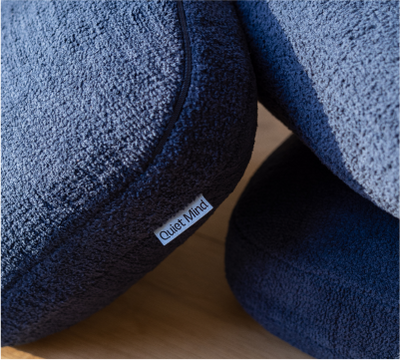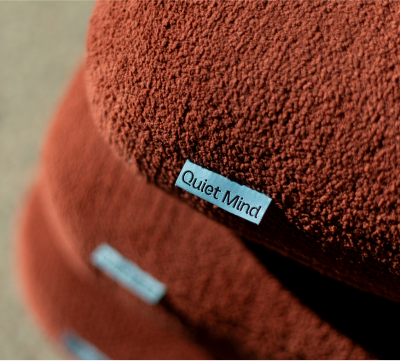Some nights, sleep just doesn’t happen. And by morning, the heaviness sets in; mentally, physically, emotionally.
In a world that often celebrates pushing through, it's natural to ask: how little sleep can you survive on? The answer depends on many factors, but one thing is clear. Even a single night without sleep can affect your focus and mood, and going longer can take a real toll on your body.
This guide looks at what happens when you don't get enough rest. We'll explore how your body responds, the signs that it's time to pause, and how to care for yourself gently when sleep is in short supply.
Why We Need Sleep in the First Place
Sleep is not idle time. It’s an essential rhythm of renewal.
When we rest, our bodies and minds do vital work; healing tissues, processing emotions, balancing hormones, and clearing out toxins from the brain.
REM sleep and deep sleep support focus, memory, emotional balance, metabolic health, and more. Without good sleep, these systems can’t fully recover.
Among its many benefits, sleep:
- Enhances focus, memory, and decision-making.
- Regulates mood and emotional responses.
- Strengthens immune defense and cardiovascular health.
- Supports cellular repair and hormonal balance.
Not prioritizing sleep quietly chips away at both quality and quantity. The National Sleep Foundation recommends adults aim for 7–9 hours of sleep each night. Regularly getting less than that is a quiet way of harming your health.
What Science Says About the Minimum Sleep Needed
The idea of a universal “minimum” amount of sleep is complex. While science points to seven hours of sleep as a threshold for minimum functionality, it’s important to remember that individual sleep needs vary.
The American Academy of Sleep Medicine agrees: seven or more hours is the recommended amount of sleep for adults. Anything less than seven hours puts your health at risk over time.
Can You Actually Die from Lack of Sleep?
In animal studies, total sleep deprivation has been fatal. While extreme cases in humans are rare, going 48 hours without sleep or more has serious consequences. Sleep deprivation can significantly raise the risk of:
- Hallucinations
- Cognitive breakdown
- Heart disease
- Blood pressure dysregulation
- Weakened immunity
More often, the damage is slow and cumulative; manifesting as burnout, chronic illness, or emotional fragility. Going days without sleep, or regularly sleeping less than six hours or less, can eventually break down both body and mind.
Sleep Deprivation vs. Sleep Restriction: Key Differences
Not all sleep loss is the same; here’s how deprivation and restriction differ.
|
Type |
Cause |
Impact |
|
Sleep Deprivation |
Unintentional (e.g., insomnia) |
Sudden, severe cognitive and physical decline |
|
Sleep Restriction |
Intentional (e.g., overwork, shift work) |
Slow accumulation of sleep debt, reduced function over time |
Sleep deprivation refers to getting no sleep or nearly none for a stretch of time. Think of pulling a 36- or 48-hour stint awake. It leads to faster breakdown.
Sleep restriction, on the other hand, is more subtle. You’re technically sleeping, but not enough. Think six hours or less every night. This leads to a slow, quiet erosion of health over weeks or months.
Both states interfere with sleep hygiene, metabolic processes, and mental clarity. And both can lead to symptoms like:
- Brain fog
- Mood swings
- Low energy
- Cravings
- Poor decision-making
Whether you're skipping full nights or simply trimming your hours a night to "get more done," the end result is the same: you’re sleep-deprived.
How Many Hours of Sleep Can a Human Survive On?
The human body is resilient, but resilience is not the same as wellness.
Insights from Sleep Experiments and Case Studies
The most famous real-life case is Randy Gardner, a teenager who stayed awake for 11 days (264 hours) during a 1964 sleep study. He experienced:
- Hallucinations
- Mood swings
- Memory loss
- Slurred speech
- Impaired motor coordination
Though he recovered, the experiment demonstrated how quickly sleep deprivation and its effects can escalate. Other studies show similar results: the less sleep you get, the worse your performance and the longer it takes to recover.
In fact, sleep experts argue that even a night or two of poor sleep can impact your mood, metabolism, and decision-making.
The Role of Microsleeps in Pushing Limits
Microsleeps are short, involuntary lapses in consciousness lasting 1–10 seconds. They occur when the brain forces rest, even while you’re still technically awake.
They’re a key warning sign of sleep deprivation and are most common after 24–48 hours awake. The danger? You may be unaware they’re happening, especially while driving or working.
Microsleeps signal that your brain is without enough sleep and no longer able to function reliably. Even if you feel alert, your neurons are shutting down behind the scenes.
How Lack of Sleep Affects the Brain and Mood
Sleep loss reaches far beyond physical fatigue. It alters how you think, feel, and respond.
Sleep doesn’t just rest your body, it organizes thoughts, regulates emotion, and strengthens memory. When you’re sleep-deprived, these processes break down.
Cognitive Fog and Emotional Dysregulation
Just one night of less than seven hours can:
- Reduce your attention span
- Impair decision-making
- Increase impulsivity
- Trigger anxiety or irritability
- Lower your emotional resilience
In fact, the brain under sleep deprivation mirrors the brain under intoxication. You may think you’re functioning, but studies show otherwise.
Small Habits That Support Brain & Mood Health
The good news? You can support your sleep health with simple shifts:
- Go to sleep and wake up at the same time every day.
- Avoid caffeine in the evening, as it can interfere with your ability to fall asleep.
- Limit phone use at least two hours before sleep to help your brain wind down.
- Create a dark, cool, quiet sleep environment.
- Practice mindfulness or breathing exercises before bed.
- Use sleep tips from behavioral science or sleep medicine specialists.
When you improve your sleep hygiene, you not only recover faster, you also boost your long-term cognitive health.
How Sleep Loss Impacts Your Body
Poor sleep doesn’t just make you tired, it disrupts essential biological systems. The amount of sleep you get affects everything from metabolism to immune defense. Even one night or two of poor sleep can interfere with hormone regulation, cell repair, and digestion.
If you don’t get enough sleep on a regular basis, your body begins to experience a cascade of negative outcomes; especially when hours of sleep deprivation pile up.
Impacts on Brain Function and Mental Clarity
When you’re sleep-deprived, your brain loses its ability to process, retain, and recall information. After just a few nights of six hours or less, your reaction time, creativity, and memory are already compromised.
Tasks that once felt easy now require extra effort. Communication becomes harder. Problem-solving slows down. Even small decisions start to feel overwhelming.
This happens not just because of sleep duration, but because the brain isn’t entering deep sleep or REM sleep often enough to properly consolidate information.
Hormonal and Metabolic Disruptions
Sleep deprivation can significantly alter hormonal balance. When you sleep too little:
- Cortisol (stress hormone) increases
- Leptin (satiety hormone) decreases
- Ghrelin (hunger hormone) increases
This hormone imbalance can cause cravings, weight gain, and blood sugar swings. Over time, poor sleep contributes to insulin resistance and increases the risk of type 2 diabetes.
Your body requires hours of sleep a night to regulate metabolism effectively. Without that, it goes into stress mode, constantly alert, inflamed, and running on empty.
Risks to Heart, Immunity, and Organ Health
According to the National Institute of Health, people who regularly sleep less than seven hours are more likely to develop:
- High blood pressure
- Weakened immune response
- Cardiovascular disease
- Slower wound and tissue healing
Each night of sleep acts like preventive medicine. The less you sleep, the more these protective systems break down. That’s why sleep can impact both daily energy and long-term health outcomes.
Is It Possible to Train Your Body to Need Less Sleep?
The idea of sleeping less and getting more done is tempting, especially in a culture that rewards productivity. But for most people, it’s simply not sustainable.
What About “Short Sleepers”?
A very small number of people have a rare genetic trait that allows them to function well on just 4 to 6 hours of sleep each night. These individuals, sometimes called “natural short sleepers,” show:
- No noticeable drop in cognitive or physical performance.
- No increase in long-term health risks.
- Consistently restful, high-quality sleep in less time.
But this isn’t something you can train your body to do. It’s a genetic exception, not a goal to chase.
Why Most People Can’t Function on 4 Hours of Sleep
For the vast majority, sleeping less than 6 hours a night leads to real consequences. Over time, most people will experience:
- Mood swings or emotional reactivity.
- Brain fog and reduced focus.
- Increased risk of chronic health conditions.
Even if you feel like you've adjusted to sleeping less, your body hasn’t. The effects may show up slowly, but they build, quietly impacting your health and well-being.
Warning Signs You’re Running on Too Little Sleep
Sleep deprivation doesn’t always announce itself loudly. It often builds gradually, and you may feel like you're functioning, until the signs begin to surface.
Subtle Symptoms You Shouldn’t Ignore
Some early signs of sleep debt include:
- Low patience or emotional reactivity.
- Difficulty focusing or absorbing information.
- Forgetfulness or misplaced items.
- Headaches, dry skin, or general tension.
- Slower recovery from illness.
- Feeling exhausted but still can’t sleep even though tired.
If these symptoms show up often, especially alongside short or inconsistent sleep, your body may be quietly asking for rest.
Common Effects of Sleep Loss
Sleep loss impacts more than just energy levels; it affects your mind, mood, and body.
|
Symptom Type |
Examples |
|
Cognitive |
Slowed thinking, forgetfulness |
|
Emotional |
Irritability, anxiety, mood fluctuations |
|
Physical |
Fatigue, tension, frequent colds |
These signals aren’t just inconveniences, they’re reminders that your system needs care. Gently adjusting your sleep habits can help restore balance over time.
How to Survive Short-Term Sleep Deprivation (Safely)
Sometimes, missing sleep is part of life. A newborn's needs, a pressing deadline, a long flight, or unexpected stress can temporarily disrupt your rest. When that happens, the goal isn't perfection, it’s protection. The body is resilient, and with a few supportive strategies, you can help soften the impact of short-term sleep loss.
Napping Wisely: Restoring Energy Without Disrupting Your Night
Even a short nap can help restore clarity and ease fatigue, but timing and length matter.
- Keep naps short, ideally between 20 and 30 minutes to avoid grogginess or “sleep inertia.”
- Nap in the early afternoon when your energy naturally dips, rather than late in the day.
- Find a quiet, dim space to rest, even if just for a few moments of calm.
These micro-rests won’t replace deep sleep, but they can offer a gentle reset for your nervous system.
Light, Hydration, and Nutrition: Small Shifts That Make a Big Difference
When sleep is in short supply, the basics matter more than ever. Supporting your body with small acts of care can help you stay steady.
- Hydrate well throughout the day. Even mild dehydration can amplify feelings of fatigue.
- Eat nourishing meals rich in whole foods like fruits, vegetables, healthy fats, and proteins to sustain energy and mood.
- Use light mindfully. Bright light in the morning and throughout the day helps reinforce your natural circadian rhythm. In the evening, use dim lights to signal wind-down time.
Creating a calm environment and following natural rhythms, even imperfectly can make a meaningful difference.
Sleep Banking: Preparing for Rest Disruptions in Advance
If you know a sleep-challenging period is coming, like travel or caregiving, you can gently “bank” extra rest ahead of time.
- Add 30 to 60 minutes of sleep per night for a few nights in advance.
- Keep your bedtime and wake time consistent to support rhythm stability.
- Prioritize wind-down routines, even if your schedule is off.
Sleep banking won’t eliminate the effects of sleep loss, but it can give your body a little extra reserve to draw from.
Short-term sleep deprivation can be tough, but it doesn’t have to be damaging. With small, intentional shifts, you can support your body’s needs while navigating the demands of life. Be kind to yourself in the process. Rest will return.
When To Worry About Sleep Loss and Get Help
Occasional restlessness is part of life. But if sleep struggles become a regular pattern, it may be time to reach out for help.
Consider speaking with a healthcare provider if you:
- Struggle to fall asleep or stay asleep most nights.
- Wake feeling unrefreshed, even after spending enough time in bed.
- Notice ongoing fatigue, mood shifts, or brain fog affecting daily life.
- Snore loudly, gasp, or stop breathing during sleep.
Conditions like insomnia, sleep apnea, and circadian rhythm disorders are often treatable; but they’re also commonly overlooked. Getting the right support can help you better understand what's disrupting your rest and explore options that may help cure poor sleep at its root.
Your rest is not a luxury. It’s a foundation for how you feel, think, and move through the world. You deserve support.
What Famous Cases Teach Us About Sleep Deprivation
Randy Gardner’s 1964 sleep experiment remains one of the most extreme and eye-opening cases in the history of sleep research. At just 17 years old, Gardner voluntarily stayed awake for 11 consecutive days, 264 hours without sleep as part of a high school science fair project.
While no long-term physical damage was reported, the short-term effects were undeniable and severe: hallucinations, paranoia, cognitive disorientation, memory lapses, and poor motor coordination.
Gardner's experience shows that even if you can technically “survive” without sleep, you cannot escape the consequences. His experiment also laid the groundwork for future studies that helped define the recommended hours of sleep, the importance of REM sleep, and the physiological toll of sleep deprivation.
Subsequent research has confirmed these effects in more controlled settings. Clinical studies have shown that people who get five hours of sleep or less for just one week experience cognitive impairment similar to someone legally intoxicated.
Even two nights of poor sleep can cause measurable declines in reaction time, memory consolidation, emotional regulation, and decision-making ability.
Modern neuroscience also tells us that the body doesn’t simply “reset” after getting more sleep the next night.
While recovery sleep can help, your body remembers the stress and inflammation caused by deprivation. It’s not just about catching up, it’s about protecting the systems that are damaged in the first place.
Final Thoughts
Sleep is essential, not optional. While we live in a culture that often glorifies being busy and functioning on minimal rest, modern sleep science tells a different story. The idea that you can adapt to less sleep than you need is one of the most damaging myths in health.
Sure, the body is adaptable. You can make it through a day or two with less than the recommended amount of sleep. You can get by on five hours of sleep for a few nights if you absolutely must. But this survival mode is not sustainable and it isn’t healthy. Sleep deprivation can increase your risk of chronic illness, emotional burnout, and poor cognitive performance.
If you're consistently sleep-deprived, or don’t sleep enough due to stress, anxiety, or irregular schedules, it's time to take your rest seriously. Recovery doesn’t start with caffeine or pushing through. It starts with recognizing that sleep is medicine, and your body keeps score of every hour you miss.
Listen to science. Prioritize rest. Respect your rhythms. Because when it comes to sleep, the body doesn’t negotiate, it remembers.
About Quiet Mind
Quiet Mind exists to make rest restorative again. In a world that encourages constant motion, we create calming tools and gentle support to help you reconnect with your body’s natural rhythms.
Whether you're seeking a moment of calm during a hectic day or a more restful night’s sleep, our weighted pillows are designed to provide soothing pressure and support deeper relaxation, helping you find your way back to rest.
Frequently Asked Questions
How many hours of sleep do I need per night?
Most adults need 7–9 hours to function optimally. Some may feel rested slightly more or less, but fewer than 6 hours is rarely sustainable.
Can I survive on 4 hours of sleep?
You can survive but likely not thrive. Chronic short sleep increases risks for emotional distress, poor focus, and long-term disease.
How long can I go without sleep?
The longest documented case is 11 days, but cognitive and emotional symptoms appear within 24–48 hours. The body begins to decline rapidly without rest.
Can I train my body to need less sleep?
Only a rare few have a genetic mutation that allows this. For most, reducing sleep leads to performance decline and health risks.
What are the warning signs of too little sleep?
Mood swings, poor concentration, frequent illness, and physical signs like dark circles or dry skin can all indicate chronic sleep debt.

















